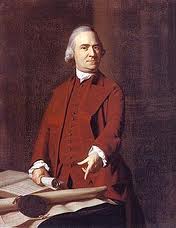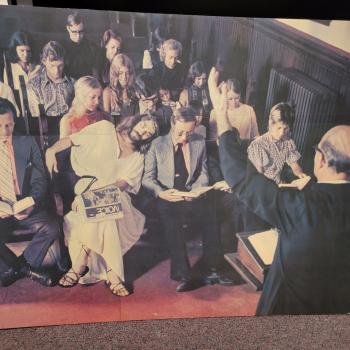Samuel Adams, the man not the beer,though he and his father were indeed ‘maltsters’ as they were called in the 18th century, is of course best known for his role in prompting the American revolution, having something to do with: 1) the protest that led to the Boston massacre; 2) the Boston tea party; 3) the forming of documents that led to our Declaration of Independence (see picture above of him in Faneuil Hall pointing to the Massachusetts charter), and 4) had more than a little to do with the governance of Massachusetts, being its governor at one point. What is less well known is his ardent Christian faith, and his willingness to critique various of the Founding Fathers for their promotion of ‘infidelity’. One particular target of his ire towards the end of his life (he died in 1803) was Thomas Paine. The following is a letter he wrote, rebuking Paine. Adams in general was no friend of Deism and pure rationalism which in fact was the default religion of various of our founding fathers, including Paine and Jefferson.
——–
Boston, November 30, 1802
Sir:
I have frequently with pleasure reflected on your services to my native and your adopted country. Your “Common Sense” and your “Crisis” unquestionably awakened the public mind, and led the people loudly to call for a declaration of our national independence. I therefore esteemed you as a warm friend to the liberty and lasting welfare of the human race. But when I heard that you had turned your mind to a defense of infidelity, I felt myself much astonished and more grieved that you had attempted a measure so injurious to the feelings and so repugnant to the true interest of so great a part of the citizens of the United States.
The people of New England, if you will allow me to use a Scripture phrase, are fast returning to their first love. Will you excite among them the spirit of angry controversy, at a time when they are hastening to unity and peace? I am told that some of our newspapers have announced your intention to publish an additional pamphlet upon the principles of your “Age of Reason.”
Do you think that your pen, or the pen of any other man can unchristianize the mass of our citizens, or have you hopes of converting a few of them to assist you in so bad a cause? We ought to think ourselves happy in the enjoyment of opinion without the danger of persecution by civil or ecclesiastical law.
Our friend, the President of the United States, has been calumniated for his liberal sentiments, by men who have attributed that liberality to a latent design to promote the cause of infidelity. This and all other slanders have been made without a shadow of proof. Neither religion nor liberty can long subsist in the tumult of altercation, and amidst the noise and violence of faction.
Felix qui cautus.
Adieu. SAMUEL ADAMS.

















